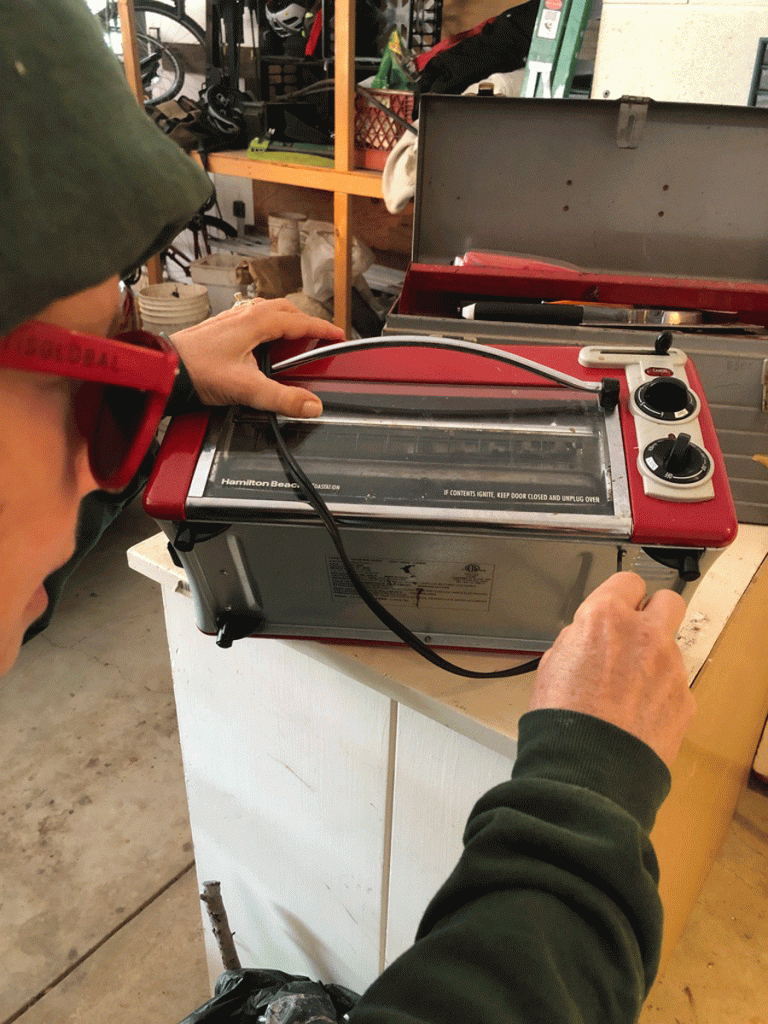
by Karen Telleen-Lawton, Noozhawk Columnist, Read the original column at Noozhawk.com
I loathe waste. Plastic pump soap dispensers have no place when a paper-wrapped bar of soap does the job at a small fraction of the cost.
I can afford a new lamp, but prefer to replace the plug on my old one for reasons more than sentimental.
Along with reduce, reuse, and recycle comes a fourth R: Repair.
A few college friends of mine felt the same way and did something about it. Peter Skinner had learned about a “new” concept sweeping the world: fixing items instead of sending them to the dump.

Repair Cafes began in Netherlands in 2009 and spread to thousands of cities around the world. Skinner, along with his wife Marie Earl, Bob Wenzlau, and others, began the first U.S. version in 2012.
The Bay Area cafes are quarterly social and work events in donated space. Volunteer “fixers” including engineering professors and students manage to “repair or partially repair” about 75% of the items brought in. Electronics, irons, toasters, clothing, household fixtures and furniture all get second lives, making a tiny dent in what would have been landfilled.
According to the EPA, the amount of waste sent to U.S. landfills roughly tripled between 1960 and 2017, even though the U.S. population less than doubled.
“The idea of disassembly isn’t built into products,” explains Wenzlau in a Stanford Magazine interview. “If we have a zero-waste goal, how can we keep this material out of the landfill? Repair fits in really well with a zero-waste strategy.”
Repair Cafes labor against the current of manufacturers. Tech and other consumer products companies have flummoxed would-be fixers by withholding parts and repair manuals and even installing software locks. The locks ensure that only they or authorized service companies can repair items.
In the past few years, New York, Colorado and Minnesota have all passed “Right to Repair” laws. California advocates have been working on legislation for five years, getting as far as the Senate Appropriations Committee before intense industry lobbying crushed the bills.
This year, California State Bill 244, with lead author Sen. Susan Eggman, passed the State Senate and is now in the State Assembly.
“This is a huge victory for anyone who’s ever been faced with limited options when their phone, fridge or other household electronics break down,” said CALPIRG State Director Jenn Engstrom. “It’s due time that California fixed its laws so that we can fix our stuff.”
According to CALPIRG (California Public Interest Research Group), the Right to Repair is supported by 77 percent of Democrats, 61% of Republicans, and 82% of Independents. It is opposed by only 5% of Americans.
What’s not to like? Fixing promotes self-sufficiency, reduces tonnage sent to landfills, and saves consumers money. U.S. PIRG estimates families who repair save around $382 per year off their average $1,767 in annual new electronics.
“Enshrining access to repair in California law will help small businesses, consumers and our environment,” says Eggman. “I’m hopeful that we can deliver that this year.”
Meanwhile, the movement is growing. Repaircafe.org estimates there are 2,500 repair cafes in the world. The Bay Area now operates four Repair Cafes.
Another legislative setback wouldn’t stop the repair movement. But it might make Peter, Marie, Bob and their colleagues outlaws. Which could bring forth another R: Rebel (for the Right to Repair).

Karen Telleen-Lawton, Noozhawk Columnist
Karen Telleen-Lawton is an eco-writer, sharing information and insights about economics and ecology, finances and the environment. Having recently retired from financial planning and advising, she spends more time exploring the outdoors — and reading and writing about it. The opinions expressed are her own.

